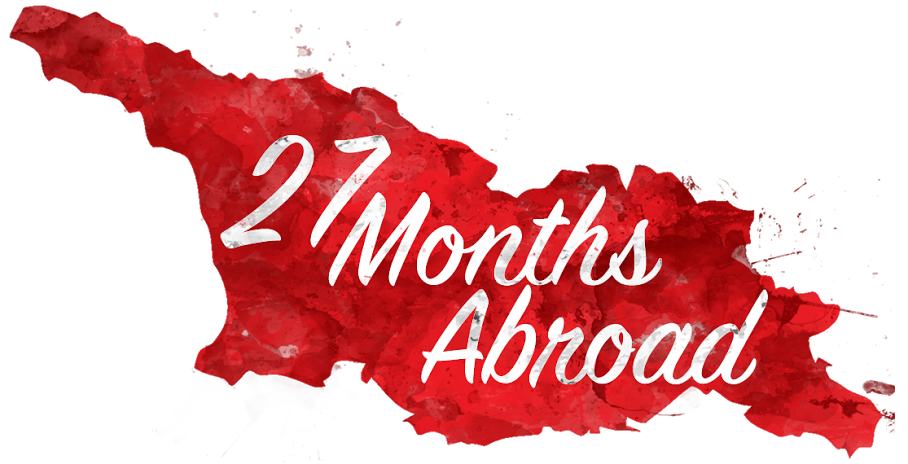Given it is early December, I only hang out consistently with a warm metal box at my house; I call it my heater. Everyone else calls it a heater too, so I suppose I should give it a better nickname…Regardless, I was next to the only heater in my place, propping my feet up on a stool, with my laptop on my lap (and verifying in my mind, once again, why they named a laptop). Most Georgian homes do not have insulation or central heating. I am extremely lucky to have one gas heater in my home that works- even if it does not heat the entire house. So there I am sitting there trying to stay warm when suddenly my dad calls me on Facebook Messenger.

He begins with, “How are you doing, Baba?” I responded with, “I’m working right now.” He was confused since it was around 10 p.m. at night on Saturday. I told him two things: 1) Peace Corps life does not have a regular 40 hour week. It especially does not end at the end of the workday. 2) I had a record number of grants to read, so working on the weekend was a given. This promoted a discussion to exactly what grants are in Peace Corps and why I was reading them. I told him that I was on the Small Projects Assistance Committee. Since my dad was curious, I thought….this might be a good blog post.
I had barely mentioned that I was on SPA on this post, but I did not go into detail. As stated on the USAID website, “The Small Project Assistance Program (SPA) is a joint collaboration between USAID and the Peace Corps to support local community development…Local Sustainability Division manages USAID Mission access to SPA and encourages USAID Missions and Offices to participate in the program. Peace Corps Volunteers compete for funds allocated by USAID through a proposal process managed by the local Peace Corps field offices.” I believe that each Peace Corps manages SPA slightly differently, but since I’m in Georgia, I’ll explain a bit of how it goes here.

Have you ever followed any of Peace Corps’ posts on social media? Well, I bet you that a lot of those posts were SPA related! For example, if you see an English Cabinet that is renovated in a village school- that is probably SPA! So basically, SPA is a powerful tool to get our $hit done! We mobilize our communities with notebooks in hand changing lives.
Sounds cheesy, well, it is because it is. How are so many of these grants ends up so awesome?

First, we welcome and encourage Peace Corps Volunteers to have us review their grants in advance before submitting it. In essence, I would read the grant and offer the Peace Corps Volunteer objective critique and constructive feedback. It could be about the grant idea in general or the actual writing of the grant.

However, they are not required to submit us anything in advance. We are there if they want us. When it comes to the recommendation after the submission deadline, each of us actually read every single grant. To reiterate, all six of us reads every single grant submitted and rates each grant based on objective criteria. During our quarterly meeting, we discuss the grant with two of the Peace Corps staff members and then offer our recommendations to the Country Director.
Each Peace Corps Volunteer and one counterpart is required to go through training at PDM Project Design Workshops. Each volunteer brings along one counterpart to the training, that way, we are also increasing the capacity of host country nationals. If the grant is approved, they are either funded a maximum of $2,500 if it is a local or $5,000 if it is community-wide. For basically chump change for many companies, these funds can literally shape and change a community.

Being a part of the process is amazing. First, I feel like it is one of most impactful part of service. I have helped dozens of volunteers with their projects indirectly. I have offered them suggestions that strengthened their proposal and/or their grant idea. Some volunteers have engaged us in conversations with their counterparts from the start. Others will just send us their final version to ensure they aren’t missing anything before the submission. However, speaking with Peace Corps Volunteers in the early stages can be fun. It can shape the success of the grant. For example, my friend Emily (who is on the Gender Equality Committee with me), engaged me from the start! She wanted to do a healthy living club at her school.

There have been times where she would call me, “Rawan, can we do this? Can we do that?” I have spoken to her and her counterparts on speaker phone giving recommendations. I also read the grant and offered a comprehensive review once she put pen to paper. When her grant got funded, I almost felt like I was a part of the project! It is awesome to serve as a resource for other volunteers to help them create and implement better projects in their community!






















